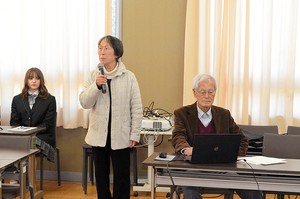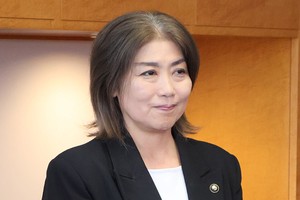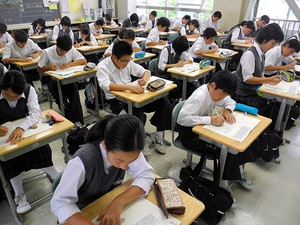By KEISHI NISHIMURA/ Staff Writer
October 1, 2021 at 18:55 JST
 A man applies for a COVID-19 vaccination certificate at the Hirakata city government office in Osaka Prefecture on July 26. (Asahi Shimbun file photo)
A man applies for a COVID-19 vaccination certificate at the Hirakata city government office in Osaka Prefecture on July 26. (Asahi Shimbun file photo)
Trial runs on further easing COVID-19 restrictions will start this month in 13 prefectures at businesses requiring customers to show vaccination certificates or negative PCR test results, the government said Sept. 30.
The experiment will cover bars and restaurants that are already certified by their prefectures as having taken sufficient anti-virus measures, as well as live houses and small theaters.
Although the state of emergency has been lifted across Japan, some restrictions remain in place on, for example, business hours, alcohol sales and crowd sizes.
The government hopes to end most of the anti-virus measures around November, when most of the population in Japan is expected to be fully vaccinated.
If the businesses require customers to show proof of vaccination or negative test result, they will be allowed to let in more people and remain open for longer hours.
The experiments at eating and drinking establishments will be conducted in 12 prefectures: Hokkaido, Saitama, Chiba, Kanagawa, Ishikawa, Shiga, Kyoto, Osaka, Hyogo, Fukuoka, Kumamoto and Okinawa.
The trial runs at live houses and small theaters will be held in four prefectures: Hokkaido, Aichi, Osaka and Kumamoto.
The names of business operators and the experiment periods will be announced on the website of the Cabinet Secretariat’s Office for Novel Coronavirus Disease Control.
The government will analyze customer lists compiled during the experiment, as well as ventilation of the venues and rates of infections.
If there are no rises in COVID-19 from the eased restrictions, the experiment could be widened to cover other targets.
A similar experiment is already planned for larger venues, such as sports stadiums and concert halls.
Health officials will check the rate of mask-wearing among the crowds and decide whether to ask spectators to refrain from cheering.
Technologies to measure crowd density and foot traffic to and from the venues will also be tested.
The larger experiments are scheduled at Saitama Stadium on Oct. 12, when Japan will face Australia in the Asian qualifiers for soccer’s World Cup in 2022, and at the Artistic and Rhythmic Gymnastics World Championships in Kita-Kyushu, Fukuoka Prefecture, that starts on Oct. 18.




















A peek through the music industry’s curtain at the producers who harnessed social media to help their idols go global.
A series based on diplomatic documents declassified by Japan’s Foreign Ministry
Here is a collection of first-hand accounts by “hibakusha” atomic bomb survivors.
Cooking experts, chefs and others involved in the field of food introduce their special recipes intertwined with their paths in life.
A series about Japanese-Americans and their memories of World War II